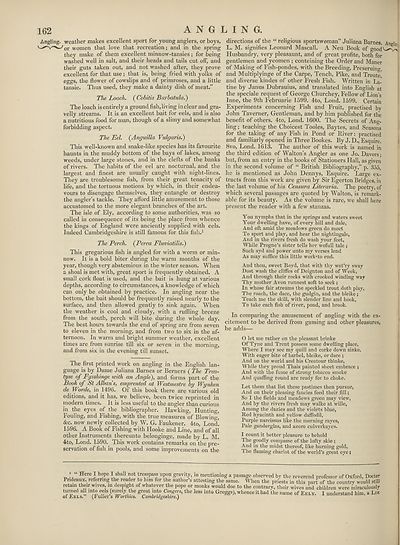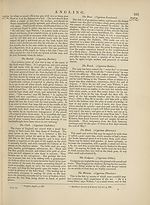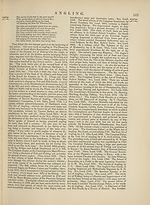Encyclopaedia Britannica > Volume 3, Anatomy-Astronomy
(170) Page 162
Download files
Complete book:
Individual page:
Thumbnail gallery: Grid view | List view

ANGLING.
162
Angling, weather makes excellent sport for young anglers, or boys,
or women that love that recreation; and in the spring
they make of them excellent minnow-tansies ; for being
washed well in salt, and their heads and tails cut off, and
their guts taken out, and not washed after, they prove
excellent for that use; that is, being fried with yolks of
eggs, the flower of cowslips and of primroses, and a little
tansie. Thus used, they make a dainty dish of meat.”
The Loach. ( Cobitis Barbatula.)
The loach is entirely a ground fish, living in clear and gra¬
velly streams. It is an excellent bait for eels, and is also
a nutritious food for man, though of a slimy and somewhat
forbidding aspect.
The Eel. {Anguilla Vulgaris.)
This well-known and snake-like species has its favourite
haunts in the muddy bottom of the bays of lakes, among
weeds, under large stones, and in the clefts of the banks
of rivers. The habits of the eel are nocturnal, and the
largest and finest are usually caught with night-lines.
They are troublesome fish, from their great tenacity of
life, and the tortuous motions by which, in their endea¬
vours to disengage themselves, they entangle or destroy
the angler’s tackle. They afford little amusement to those
accustomed to the more elegant branches of the art.
The isle of Ely, according to some authorities, was so
called in consequence of its being the place from whence
the kings of England were anciently supplied with eels.
Indeed Cambridgeshire is still famous for this fish.1
The Perch. {Perea FluviatiUs.)
This gregarious fish is angled for with a worm or min¬
now. It is a bold biter during the warm months of the
year, though very abstemious in the winter season. When
a shoal is met with, great sport is frequently obtained. A
small cork float is used, and the bait is hung at various
depths, according to circumstances, a knowledge of which
can only be obtained by practice. In angling near the
bottom, the bait should be frequently raised nearly to the
surface, and then allowed gently to sink again. When
the weather is cool and cloudy, with a ruffling breeze
from the south, perch will bite during the whole day.
The best hours towards the end of spring are from seven
to eleven in the morning, and from two to six in the af¬
ternoon. In warm and bright summer weather, excellent
times are from sunrise till six or seven in the morning,
and from six in the evening till sunset.
The first printed work on angling in the English lan¬
guage is by Dame Juliana Barnes or Berners ( The Trea-
tyse of Fysshinge with an Angle), and forms part of the
Book of St Alban's, emprented at Westmestre by Wynken
de Worde, in 1496. Of this book there are various old
editions, and it has, we believe, been twice reprinted in
modern times. It is less useful to the angler than curious
in the eyes of the bibliographer. Hawking, Hunting,
Fouling, and Fishing, with the true measures of Blowing,
&c. now newly collected by W. G. Faukener. 4to, Lond.
1596. A Book of Fishing with Hooke and Line, and of all
other Instruments thereunto belonginge, made by L. M.
4to, Lond. 1590. This work contains remarks on the pre¬
servation of fish in pools, and some improvements on the
directions of the “ religious sportswoman” Juliana Barnes. Angli
L. M. signifies Leonard Mascall. A Neu Book of good^v>
Husbandry, very pleasaunt, and of great profite, both for
gentlemen and yeomen ; conteining the Order and Maner
of Making of Fish-pondes, with the Breeding, Preseruing,
and Multiplyinge of the Carpe, Tench, Pike, and Troute'
and diverse kindes of other Fresh Fish. Written in La-
tine by Janus Dubrauius, and translated into English at
the speciale request of George Churchey, Fellow of Lion’s
Inne, the 9th Februarie 1599. 4to, Lond. 1599. Certain
Experiments concerning Fish and Fruit, practised by
John Taverner, Gentleman, and by him published for the
benefit of others. 4to, Lond. 1600. The Secrets of Ang¬
ling ; teaching the Choicest Tooles, Baytes, and Seasons
for the taking of any Fish in Pond or River: practised
and familiarly opened in Three Bookes. By J. D., Esquire.
8vo, Lond. 1613. The author of this work is named in
the third edition of Walton’s Angler as one Jo. Davors;
but, from an entry in the books of Stationers Hall, as given
in the second volume of “ British Bibliography,” p. 355,
he is mentioned as John Dennys, Esquire. Large ex¬
tracts from this work are given by Sir Egerton Bridges, in
the last volume of his Censura Literaria. The poetry, of
which several passages are quoted by Walton, is remark¬
able for its beauty. As the volume is rare, we shall here
present the reader with a few stanzas.
You nymphs that in the springs and waters sweet
Your dwelling have, of every hill and dale,
And oft amid the meadows green do meet
To sport and play, and hear the nightingale,
And in the rivers fresh do wash your feet,
While Progne’s sister tells her wofull tale ;
Such ayd and power unto my verses lend
As may suffice this little work* to end.
And thou, sweet Boyd, that with thy wafr}* sway
Dost wash the cliffes of Deignton and of Week,
And through their rocks with crooked winding way
Thy mother Avon runnest soft to seek;
In whose fair streams the speckled trout doth play,
The roach, the dace, the gudgin, and the bleike;
Teach me the skill, with slender line and hook,
To take each fish of river, pond, and brook.
In comparing the amusement of angling with the ex¬
citement to be derived from gaming and other pleasures,
he adds—
O let me rather on the pleasant brinke
Of Tyne and Trent possess some dwelling place,
Where I may see my quill and corke down sinke,
With eager bite of barbel, bleike, or dace ;
And on the world and his Creatour thinke,
While they proud Thais painted sheet embrace ;
And with the fume of strong tobacco smoke
And quaffing round are ready for to choke.
Let them that list these pastimes then pursue,
And on their pleasing fancies feed their fill;
So I the fields and meadows green may view,
And by the rivers fresh may walke at wille,
Among the dazies and the violets blue,
Red hyacinth and yellow daffodil,
Purple narcissus like the morning raves,
Pale ganderglas, and azore culverkayes.
I count it better pleasure to behold
The goodly compasse of the lofty skie ;
And in the midst thereof, like burning gold,
The flaming chariot of the world’s great eye;
’ “ Here I hope I shall not tresspass upon gravity, in mentioning a passage observed bv the reverend professor of Oxford, Doctor
Pndeaux, referring the reader to him for the author’s attesting the same. When the priests in this part of the country would still
retain their wives in despight of whatever the pope or monks would doe to the contrary, their wives and children were miraculously
turned all into eels (surely the great into Congers, the less into Greggs j, whence it had the name of Eely. I understand him, a Lie
nr r.T?T s. flMillpr s 14/nrihins. i nmhrr/io-pshirp \
162
Angling, weather makes excellent sport for young anglers, or boys,
or women that love that recreation; and in the spring
they make of them excellent minnow-tansies ; for being
washed well in salt, and their heads and tails cut off, and
their guts taken out, and not washed after, they prove
excellent for that use; that is, being fried with yolks of
eggs, the flower of cowslips and of primroses, and a little
tansie. Thus used, they make a dainty dish of meat.”
The Loach. ( Cobitis Barbatula.)
The loach is entirely a ground fish, living in clear and gra¬
velly streams. It is an excellent bait for eels, and is also
a nutritious food for man, though of a slimy and somewhat
forbidding aspect.
The Eel. {Anguilla Vulgaris.)
This well-known and snake-like species has its favourite
haunts in the muddy bottom of the bays of lakes, among
weeds, under large stones, and in the clefts of the banks
of rivers. The habits of the eel are nocturnal, and the
largest and finest are usually caught with night-lines.
They are troublesome fish, from their great tenacity of
life, and the tortuous motions by which, in their endea¬
vours to disengage themselves, they entangle or destroy
the angler’s tackle. They afford little amusement to those
accustomed to the more elegant branches of the art.
The isle of Ely, according to some authorities, was so
called in consequence of its being the place from whence
the kings of England were anciently supplied with eels.
Indeed Cambridgeshire is still famous for this fish.1
The Perch. {Perea FluviatiUs.)
This gregarious fish is angled for with a worm or min¬
now. It is a bold biter during the warm months of the
year, though very abstemious in the winter season. When
a shoal is met with, great sport is frequently obtained. A
small cork float is used, and the bait is hung at various
depths, according to circumstances, a knowledge of which
can only be obtained by practice. In angling near the
bottom, the bait should be frequently raised nearly to the
surface, and then allowed gently to sink again. When
the weather is cool and cloudy, with a ruffling breeze
from the south, perch will bite during the whole day.
The best hours towards the end of spring are from seven
to eleven in the morning, and from two to six in the af¬
ternoon. In warm and bright summer weather, excellent
times are from sunrise till six or seven in the morning,
and from six in the evening till sunset.
The first printed work on angling in the English lan¬
guage is by Dame Juliana Barnes or Berners ( The Trea-
tyse of Fysshinge with an Angle), and forms part of the
Book of St Alban's, emprented at Westmestre by Wynken
de Worde, in 1496. Of this book there are various old
editions, and it has, we believe, been twice reprinted in
modern times. It is less useful to the angler than curious
in the eyes of the bibliographer. Hawking, Hunting,
Fouling, and Fishing, with the true measures of Blowing,
&c. now newly collected by W. G. Faukener. 4to, Lond.
1596. A Book of Fishing with Hooke and Line, and of all
other Instruments thereunto belonginge, made by L. M.
4to, Lond. 1590. This work contains remarks on the pre¬
servation of fish in pools, and some improvements on the
directions of the “ religious sportswoman” Juliana Barnes. Angli
L. M. signifies Leonard Mascall. A Neu Book of good^v>
Husbandry, very pleasaunt, and of great profite, both for
gentlemen and yeomen ; conteining the Order and Maner
of Making of Fish-pondes, with the Breeding, Preseruing,
and Multiplyinge of the Carpe, Tench, Pike, and Troute'
and diverse kindes of other Fresh Fish. Written in La-
tine by Janus Dubrauius, and translated into English at
the speciale request of George Churchey, Fellow of Lion’s
Inne, the 9th Februarie 1599. 4to, Lond. 1599. Certain
Experiments concerning Fish and Fruit, practised by
John Taverner, Gentleman, and by him published for the
benefit of others. 4to, Lond. 1600. The Secrets of Ang¬
ling ; teaching the Choicest Tooles, Baytes, and Seasons
for the taking of any Fish in Pond or River: practised
and familiarly opened in Three Bookes. By J. D., Esquire.
8vo, Lond. 1613. The author of this work is named in
the third edition of Walton’s Angler as one Jo. Davors;
but, from an entry in the books of Stationers Hall, as given
in the second volume of “ British Bibliography,” p. 355,
he is mentioned as John Dennys, Esquire. Large ex¬
tracts from this work are given by Sir Egerton Bridges, in
the last volume of his Censura Literaria. The poetry, of
which several passages are quoted by Walton, is remark¬
able for its beauty. As the volume is rare, we shall here
present the reader with a few stanzas.
You nymphs that in the springs and waters sweet
Your dwelling have, of every hill and dale,
And oft amid the meadows green do meet
To sport and play, and hear the nightingale,
And in the rivers fresh do wash your feet,
While Progne’s sister tells her wofull tale ;
Such ayd and power unto my verses lend
As may suffice this little work* to end.
And thou, sweet Boyd, that with thy wafr}* sway
Dost wash the cliffes of Deignton and of Week,
And through their rocks with crooked winding way
Thy mother Avon runnest soft to seek;
In whose fair streams the speckled trout doth play,
The roach, the dace, the gudgin, and the bleike;
Teach me the skill, with slender line and hook,
To take each fish of river, pond, and brook.
In comparing the amusement of angling with the ex¬
citement to be derived from gaming and other pleasures,
he adds—
O let me rather on the pleasant brinke
Of Tyne and Trent possess some dwelling place,
Where I may see my quill and corke down sinke,
With eager bite of barbel, bleike, or dace ;
And on the world and his Creatour thinke,
While they proud Thais painted sheet embrace ;
And with the fume of strong tobacco smoke
And quaffing round are ready for to choke.
Let them that list these pastimes then pursue,
And on their pleasing fancies feed their fill;
So I the fields and meadows green may view,
And by the rivers fresh may walke at wille,
Among the dazies and the violets blue,
Red hyacinth and yellow daffodil,
Purple narcissus like the morning raves,
Pale ganderglas, and azore culverkayes.
I count it better pleasure to behold
The goodly compasse of the lofty skie ;
And in the midst thereof, like burning gold,
The flaming chariot of the world’s great eye;
’ “ Here I hope I shall not tresspass upon gravity, in mentioning a passage observed bv the reverend professor of Oxford, Doctor
Pndeaux, referring the reader to him for the author’s attesting the same. When the priests in this part of the country would still
retain their wives in despight of whatever the pope or monks would doe to the contrary, their wives and children were miraculously
turned all into eels (surely the great into Congers, the less into Greggs j, whence it had the name of Eely. I understand him, a Lie
nr r.T?T s. flMillpr s 14/nrihins. i nmhrr/io-pshirp \
Set display mode to:
![]() Universal Viewer |
Universal Viewer | ![]() Mirador |
Large image | Transcription
Mirador |
Large image | Transcription
Images and transcriptions on this page, including medium image downloads, may be used under the Creative Commons Attribution 4.0 International Licence unless otherwise stated. ![]()
| Encyclopaedia Britannica > Encyclopaedia Britannica > Volume 3, Anatomy-Astronomy > (170) Page 162 |
|---|
| Permanent URL | https://digital.nls.uk/193759558 |
|---|
| Attribution and copyright: |
|
|---|---|
| Shelfmark | EB.16 |
|---|---|
| Description | Ten editions of 'Encyclopaedia Britannica', issued from 1768-1903, in 231 volumes. Originally issued in 100 weekly parts (3 volumes) between 1768 and 1771 by publishers: Colin Macfarquhar and Andrew Bell (Edinburgh); editor: William Smellie: engraver: Andrew Bell. Expanded editions in the 19th century featured more volumes and contributions from leading experts in their fields. Managed and published in Edinburgh up to the 9th edition (25 volumes, from 1875-1889); the 10th edition (1902-1903) re-issued the 9th edition, with 11 supplementary volumes. |
|---|---|
| Additional NLS resources: |
|

